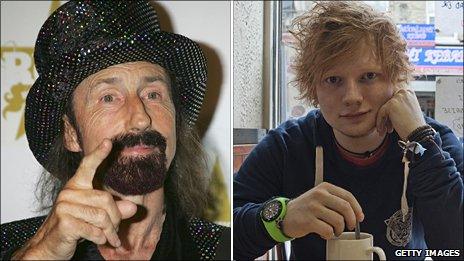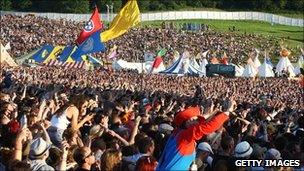Glastonbury: Spirit of '71 vs Spirit of '11
- Published

The Crazy World of Arthur Brown returns after 40 years while Ed Sheeran (right) makes his Glastonbury debut
The first Glastonbury was officially held in 1970. It was called the Pilton Festival and, for the price of a pound, 1,500 hippies and music fans were treated to a performance by Marc Bolan.
In 1971, with more than 12,000 people attending and a host of bands on the bill, it had grown into something which closer resembles the festival of today.
Another forty years on, to 2011, and organiser Michael Eavis has commissioned the Spirit of '71 stage, which sees artists such as The Crazy World of Arthur Brown and Melanie return to the Glastonbury stage.
But how much has the festival and the music industry changed since then?
The Crazy World of Arthur Brown first took to the stage on a sunny day four decades ago to perform hit song Fire.
Today, dressed in a pyjama-style outfit with his face smeared with brightly-coloured paint, the 69-year-old recalls his first time at Worthy farm as being "a bit sunnier".
"It was smaller and it was free, and the atmosphere was a little different: lots of people walking around naked... lots of spiritual leaders and concentration on ley lines and things like that.
"It's changed over the years to become a much bigger commercial festival but at its heart, it's still the same."
Social change
Brown insists that recent changes to the music industry, brought about by social media such as Twitter and Facebook, were encouraged by artists of his generation.
"Well, it's what we were trying to bring about in the '60s," he says.
"It's great that it's happened. We wanted to end the hierarchical control by the media and the record companies, who owned the studios and liked to tell you what to record."

There have been dramatic changes since the first festival in 1970
Ed Sheeran is a 20-year-old singer from Suffolk. His debut single, The A Team, charted at number three last week. This is his first time at Glastonbury, both as a fan and a performer.
"This is a massive benchmark - to play Glastonbury. It's the biggest festival in Europe. You grow up and you're like, 'One day I'm going to play Glastonbury'."
Sheeran thrives on live performance, typically playing more than 300 gigs in a year. Glastonbury is no different, and he is taking a guerrilla-style approach, with eight gigs scheduled across the weekend.
"I wouldn't be doing eight gigs if I didn't want to be doing eight gigs," he says.
'Festival queen'
A product of the age of social media - much of Sheeran's success comes from building up a large following on Twitter.
"I always wonder what it would have been like if I had been born earlier in the century, and whether I would have been successful playing the same sort of music," he says backstage, at the BBC Introducing stage.
"I think social media has been a great help," says Sheeran, who credits much of his success to "a big online following and a bit of independent success".
"I don't think, for instance... that I would have got signed in the '60s or '70s."
Over the years, the sheer scale of the event, and the cost of running Glastonbury, means commercial partners have been involved, leading to huge branding boards on site
It has led to some criticism that Glastonbury has become more corporate.
Sheeran disagrees: "I haven't really seen that much corporate stuff. The gig I've just done was in a tent that was solar powered - it was all very green, and there was vegetarian food, so it didn't feel very corporate - it was very chilled."
Another artist who was there in that day in June 1971 was US singer Melanie. Her hit record Brand New Key topped the US chart and went top five in the UK.
She was also acclaimed for her cover version of the Rolling Stones' Ruby Tuesday.
"It was an entirely different configuration," she recalls. "There was only one stage so it was a very different set up."
The previous year, she had also played on the same bill as The Who, Jimmy Hendrix and The Doors.
"They call me 'the festival queen' because I'm always booked at festivals, ever since Woodstock," says Melanie. "I'm happy to be back."
Melanie praises the diversity of artists playing over the weekend, with bands coming from as far away as Morocco's Master Musicians of Joujouka.
However, she believes that separating musicians by stages, some of them themed - like Spirit of '71 - was "unfortunate".
"It divides music. People say, 'Oh well, I'm not into that so I won't go there.'"
Melanie's career began nearly six decades ago, but does she envy singers who are starting out now, and more particularly, the speed at which they can record music and reach fans?
"It would have been great to have the technology but I would probably do what I have done - my way."
- Published24 June 2011
- Published23 June 2011